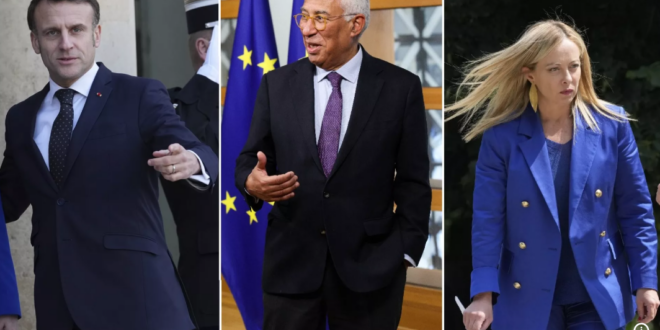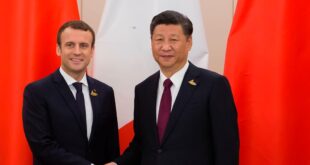Muhamad Yehia
European countries are insisting there can be no discussions about peace in Ukraine without the direct involvement of Ukraine and Europe as talks between Washington and Moscow have started.
European leaders clamouring for a seat at the negotiation table with Ukraine, Russia and the US have not started to discuss who could represent them, diplomatic sources have told Euronews.
An EU source has however confirmed to Euronews that European Council President Antonio Costa “has begun a process of bilateral consultations” with the leaders of the 27 member states to work out what they are willing to do in terms of aid to Ukraine and their positions on security guarantees.
“Coreper was informed last evening about the initiative,” the source told Euronews, referring to the forum for the bloc’s Brussels-based diplomats.
Euronews understands that the issue of appointing a European Special Envoy, as requested by Ukraine, could be discussed during the talks Costa is having with leaders
Initial talks between Washington and Moscow were held in Riyadh on Tuesday (18 February), six days after US President Donald Trump’s announcement following a “lengthy and highly productive” call with Vladimir Putin that the dialogue would begin “immediately”.
Ukrainian President Volodymyr Zelenskyy and EU leaders, who have so far been sidelined from the process, have largely condemned the bilateral talks and demanded that both Ukraine and Europe should be involved.
‘No names in the running’
Kyiv has urged the EU to appoint a special envoy, as the US has done with Gen. Keith Kellog, as a matter of urgency
“It should be a quickly-made decision,” Ihor Zhovkva, the deputy head of the office of Ukrainian President Volodymyr Zelenskyy, told Bloomberg earlier this week. “I hope right after the Paris meeting. We should act, not react.”
But despite two hastily-organised meetings in Munich and Paris between foreign affairs ministers and leaders respectively, the topic has not been raised, three diplomats have confirmed to Euronews.
“There are no names in the running. This is not a relevant question. This is not about egos of individuals, but interests. So, first we need to work on a common position of what we want, rather than discuss who should present this position,” one diplomat, speaking on condition of anonymity, told Euronews.
The informal meeting in Paris on Monday, hosted by France’s Emmanuel Macron and gathering the leaders of Germany, Britain, Italy, Poland, Spain, the Netherlands, Denmark, as well as the heads of the European Council, European Commission, and NATO, failed to provide clarity on what joint security guarantees European nations are prepared to provide as part of a peace process.
The issue of who should represent Europe during negotiations was also not mentioned, three people with knowledge of the matter confirmed to Euronews.
Macron is to host another, virtual, meeting on Wednesday with leaders from other EU countries and Norway.
?Too little, too late
For experts contacted by Euronews, Europe more or less excluded itself by not preparing for the talks earlier, including during the Biden administration – when relations with Washington were less confrontational – or in the three-month period between Trump’s re-election and inauguration.
“I think the EU or some European states should have proposed talks before Trump launched his initiative, possibly with other, non-EU states,” Claude-France Arnould, a former French diplomat and special advisor to the president for European affairs at the Institut Français des Relations Internationales (IFRI), told Euronews.
“We would not be in a situation where we try to buy a seat by striving to offer troop deployments or money in a context we don’t decide,” she added.
When Euronews canvassed opinions on who should get an invite if a seat at the table is extended, Costa and the bloc’s High Representative, Kaja Kallas, came out on top due to the responsibilities their respective roles confer them.
Armida van Rij, head of the Chatham House’s Europe programme, favoured Costa over the bloc’s top diplomat, arguing that he “might be better placed to represent member states on this issue” given his role at the European Council is to help build consensus among EU capitals.
Costa, as well as European Commission chief Ursula von der Leyen, were also cited as potential negotiators by Sven Biscop, director of the Europe in the World Programme at the Egmont Institute.
“I think the EU as such must be there because the decision to carry on with Ukraine’s membership application (if that is what we decide) is strategically crucial,” he told Euronews.
“But only states can provide Ukraine with a security guarantee, so perhaps (British Prime Minister Keir) Starmer and Macron, the two European nuclear powers and/or (Polish Prime Minister Donald) Tusk as Poland now has the largest army in Europe” and currently holds the rotating EU Council presidency, he added.
‘Unfortunate’ timing
Yet for van Rij, it is likely to be difficult for the EU leaders to appoint one of their own over fears they will favour their own national interests or positions.
Macron, for instance, has previously expressed willingness to send peacekeeping troops to Ukraine, a proposal that other member states have rejected. His star is also waning due to his weak position at home.
Additionally, he previously tried, and failed, to broker negotiations between Tehran and Washington during Trump’s first presidency, and was criticised in the process by the American leader.
Italy’s Giorgia Meloni, who is seen as being in Trump’s favour after she was invited and attended his inauguration, could be in the running. But although she is pro-Ukraine, pro-EU and pro-NATO, which would be key to garnering the support of most EU member states, Italy’s low defence spending – it does not reach NATO’s 2% of GDP target – and the fact it is not seen as a hefty military player could see it disqualified by Washington.
The timing is all the more “unfortunate”, van Rij noted, as this is happening in the midst of an election campaign in Germany that will end on February 23.
Friedrich Merz, the leader of the conservative Christian Democratic Union (CDU), is widely tipped to replace Olaf Scholz as chancellor.
His positions on Ukraine and defence seem to align more closely with those of Macron, which could see the two member states, often described as the EU’s engine, start to work in tandem again after Macron and Scholz’s relationship broke down. But it could take months of coalition talks before a new German government is instated.
It is also unclear whether the UK or other non-EU states would agree to rally behind the bloc’s pick or demand their own seats.
All this combined means “it’s so unlikely that there will be one person who will represent Europe or the EU in these discussions”, van Rij said.
Marco Rubio, the US Secretary of State, and Sergey Lavrov, Russia’s foreign minister, have both said this week that they don’t foresee Europe being involved with Rubio stating that the EU could be brought in when the issue of sanctions relief is discussed.
EU ambassadors on Wednesday approved a 16th package of sanctions on Russia for its war on Ukraine, targeting aluminium and Moscow’s so-called Shadow fleet of oil tankers among others.
 موقع وجه أفريقيا موقع وجه أفريقيا هو موقع مهتم بمتابعة التطورات في القارة الأفريقية
موقع وجه أفريقيا موقع وجه أفريقيا هو موقع مهتم بمتابعة التطورات في القارة الأفريقية



